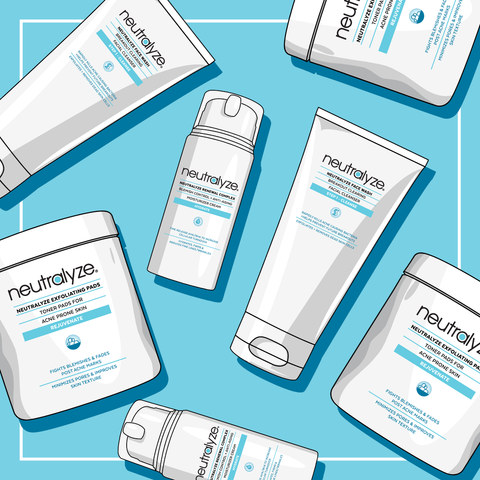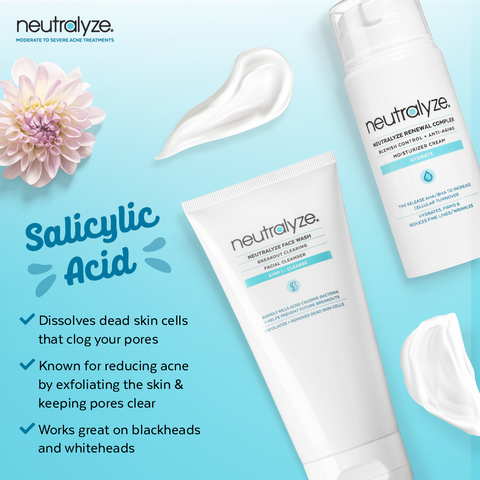Menopause and Acne: How Not to Stress About It

Acne is a common skin condition during puberty, when your oil-producing glands are very active. However, it can extend well into adulthood.
Hormonal changes at any stage in life can cause acne breakouts. As you transition into the menopausal period, your estrogen levels will take a sharp decline, among many other things, and might trigger acne. There are also other factors that can influence your skin’s health—stress, genetics, and lifestyle, to name a few.
To be able to keep your skin looking healthy and vibrant as you age, you might need to commit to better skincare habits. It might also help to make very important lifestyle changes.
Though getting acne at such a vulnerable time in your life might feel overwhelming, there are ways to manage it.
This article aims to help you better understand what goes on with your skin during menopause. You can learn about simple solutions and lifestyle changes you can make to help keep your skin clear and healthy.
What Happens to Your Skin During Menopause?
Women experience a myriad of physiological changes during the menopausal transition, and some of the most noticeable changes will be on their skin.
Visible lines and wrinkles
Women can lose about 30% of collagen on your skin during the first five years of menopause, according to the American Academy of Dermatology. The decrease becomes more gradual—around 2% of collagen per year—In the next 20 years or so.
As your body decreases collagen production, your skin begins to lose fat and elasticity. This makes common signs of aging, such as sagging skin and wrinkles, more visible.
Dry, fragile skin
When menopause, estrogen levels also drop. On the other hand, the levels of androgens (male hormones) in your body, including testosterone, will remain constant. As a result, your skin can become drier, thinner, and looser.
Simply put, your skin won’t be as strong as it once was. The changes in your hormone levels lower your defenses against dirt and other impurities in the environment.
Acne
Hormonal fluctuations may lower your skin’s natural defenses, making you more prone to acne. Without proper, consistent care, you can experience teenage-like acne breakouts usually around the chin, jaw, or mouth areas. You may also see flare-ups on your back and chest.
Even women who use hormone replacement therapy can have menopausal acne. That’s because some HRTs may use progestin to replace the declining estrogen and progesterone levels in their body.
It might be tempting to use acne products that are formulated for teenagers. However, you should refrain from doing this. Using harsh products can strip your skin of its moisture can do more harm than good. Instead, use gentle treatments with salicylic acid to treat your acne.
How to Deal with Menopausal Acne
There are many reasons why older women get acne during their menopausal transition. Aside from hormonal changes, genetics and stress are common culprits behind breakouts.
Some can treat their menopausal acne using natural methods, while others resort to prescription medication recommended by their dermatologists. Regardless of the approach you opt for, it would be helpful to supplement with simple lifestyle changes, such as getting enough sleep and eating right.
While acne, alongside many other menopausal symptoms, can seem overwhelming, try not to fret too much about it, as there are plenty of effective treatment and management options you can take.
Here are a few things you can do to treat menopausal acne and prevent future flare-ups.
Commit to a skincare routine
Everyone needs to develop proper skincare habits. Even in your menopausal period, you need to embrace healthy habits that don’t aggravate existing acne. For example, you still shouldn’t pick, pop, or squeeze acne as these would cause scars. But beyond that, you need to consistently take care of your skin.
Skincare regimens vary from person to person, as we all differ in skin types and conditions. However, every skincare routine is built on a few essentials.
- Cleanse – The primary step in any routine is having a good face cleaning regimen. Wash your face twice daily with a gentle cleanser that won’t strip your skin of its natural oils. Since your skin becomes drier as you age, a cream formula for cleansing instead of using foam or gels might suit you better.
- Moisturize – Keep your skin hydrated all day long by using a nourishing moisturizer—ideally, a heavier cream for your dry skin. Apply your moisturizer on your face, neck, and jawline after cleaning your face, particularly when these areas are still a little damp so hydration can be improved. You may also apply serums to lock in that moisture.
- Protect – Always apply sunscreen, even if you’re not going out. As you age, your skin starts to manifest the amount of sun exposure it’s gotten in the years before. Now that your skin is more vulnerable to damage, it’s essential to keep your skin protected from the harsh effects of the sun. Get a sun protection product with broad-spectrum SPF 30 (or higher) for everyday use. Use oil-free sunscreens so it doesn’t feel too heavy on the face.
- Treat – Select products based on the severity of your acne, preferably ones that don’t dehydrate the skin. You may consider prescription antibiotics and retinoids to treat your acne. Just apply sunscreen liberally when using retinoids, as they can increase your skin’s vulnerability to damaging UV rays.
- If you have mild acne, you get over-the-counter acne treatment. However, hormonal imbalance may cause severe acne such as cystic bumps, which topical solutions aren’t usually effective on. In such cases, you might need to consider oral medications, but make sure to consult with a professional before taking any oral treatments. If your acne persists despite your efforts, consult with your dermatologist.
For any skincare product, apply pea-sized amounts to your skin to prevent dehydration. Using too much product, even the right ones, can do more harm than good.
Also, take note that you need to be patient with your skincare routine. You can’t expect to see results overnight. It usually takes about 8 to 10 weeks for your regimen to show its full effects. Thus, unless your skin feels inflamed or irritated from your routine, stop switching up products every few days or so. Give your routine enough time to alleviate your acne breakout.
Eat healthy, well-balanced meals
Aside from doing your skincare regimen religiously, you may also be able to keep your skin healthy and acne-free skin by eating nutritious and well-balanced meals and minimizing consumption of food that might aggravate your acne. While you don’t have to give up these foods entirely, it’s always best to eat them in moderation.
- Dairy – Minimize your intake of dairy, whether it’s milk, cheese, or ice cream. As it is packed with artificial hormones, it may further throw off your body’s fluctuating hormone levels during menopause and contribute to future breakouts.
- High glycemic food – Avoid food that’s high on the glycemic index. This is usually starchy or sugary food such as white bread, rice, and potatoes.
- Some studies have shown that people who suffer from acne tend to have diets that are richer in carbohydrates compared to those without acne. The latter also had lower IGF-1, which is a chemical commonly associated with acne development.
- Fried food – As you might already know, fried food isn’t good for your skin or your overall health. Vegetable oil can be highly reactive and oxidative when superheated. It can bring free radicals into your body. These free radicals act as toxins that make your cells age faster. Thus, aside from potentially causing flare-ups, fried food can make the signs of aging more visible.
- Alcohol – Alcohol can further dry out your skin and make its natural defenses even more vulnerable to environmental factors. Aside from triggering breakouts, excessive alcohol consumption can also make the signs of aging more evident. It reduces your body’s vitamin A supply, which is crucial to the regeneration of new cells. This can further lead to dehydration, loss of collagen, and redness. Limit your alcohol intake if you’re trying to keep your acne at bay. Your skin is no longer as supple and as hydrated as it used to be.
Exercise regularly
So, what else can you do to prevent acne during menopause?
If you’re feeling stressed or tense about menopause, try engaging in regular exercise. Go for morning jogs or walks around the neighborhood. Regular aerobic exercises, even for just a few minutes a day, can help alleviate stress, which can impact your skin’s health. Exercising can improve your mood, promote feelings of relaxation, and promote skin health. It boosts collagen production and increases the rate of cell turnover. It also promotes blood circulation by carrying oxygen and nutrients to all the organs, including the skin, giving you a post-workout glow.
Of course, after a good workout, remember to take care of your skin. Otherwise, the heat and sweat from exercise might cause irritation. Don’t forget to immediately take a shower or to change into clean clothes right after. Stay in your sports clothes or sweatshirts might trigger acne breakouts or make your skin feel itchy. Get all the sweat and grime off using a gentle cleanser.
Takeaway
The prevalence of acne in your adult life, especially during menopause, can be affected by your skincare habits and your lifestyle. Although menopausal acne is temporary, the sudden physical changes can be both overwhelming and distressing for many women.
If you’re already experiencing these changes, try not stressing over acne, as this would only aggravate the problem. Keep in mind that menopausal acne is normal and there are plenty of ways through which you can prevent, treat, or manage flare-ups. Maintaining good hygiene, getting the best products for acne, and embracing healthy lifestyle habits can help keep your skin clear and healthy.


